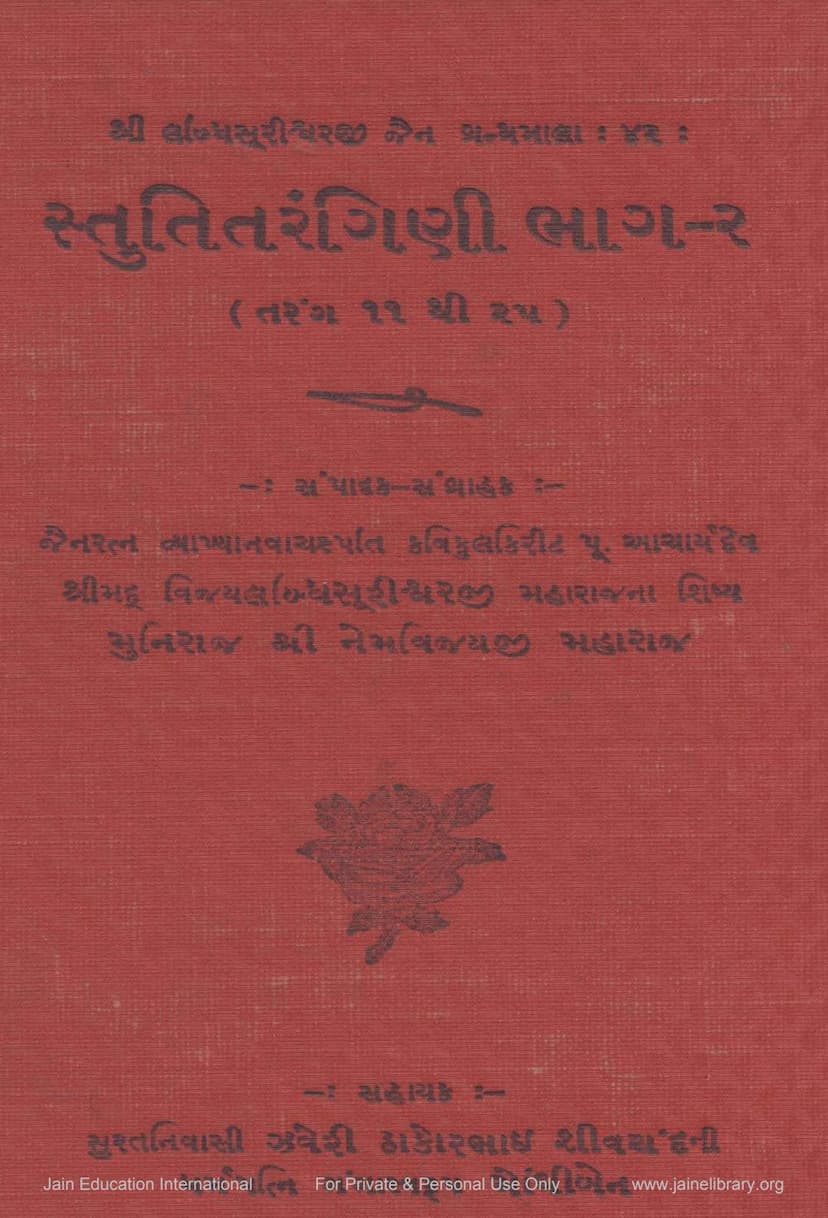Stuti Tarangini Part 02
Added to library: September 2, 2025

Summary
This summary outlines the content of "Stuti Tarangini Part 02" by Bhadrankarsuri, based on the provided text.
Book Title: Stuti Tarangini Part 02 Author: Bhadrankarsuri Publisher: Labdhi Bhuvan Jain Sahitya Sadan Catalog Link: https://jainqq.org/explore/003303/1
This second volume of "Stuti Tarangini" continues the compilation of hymns (stutis) related to Jainism, building upon the first volume. The text reveals that the collection is extensive, aiming to encompass a wide array of devotional poetry dedicated to various Tirthankaras, sacred sites, and religious observances.
Key Themes and Content:
- Extensive Collection of Hymns (Stutis): The primary focus is the compilation of a vast number of hymns in Sanskrit and Gujarati, with a significant number being previously unpublished. The first volume contained approximately 1150 stutis (750 Sanskrit, 400 Gujarati), and this second volume adds approximately 750 more (150 Sanskrit, 600 Gujarati).
- Structure and Organization: The hymns are organized into "Tarangs" (waves or chapters), with this volume covering Tarangs 11 to 25. Each Tarang appears to focus on specific themes or deities, such as Tirthankaras, pilgrimage sites, festivals, and specific deities or concepts within Jainism.
- Dedication and Support: The publication acknowledges the support of various individuals and institutions that contributed to the collection of these hymns. It highlights the dedication of Muni Shree Nemvijayji Maharaj, the author and compiler, and mentions specific patrons and donors.
- Literary and Religious Significance: The text emphasizes the value of these hymns for Jain devotees, providing a rich source of devotional material. It also highlights their importance for understanding the development of Gujarati and Sanskrit languages and Jain literary traditions.
- Specific Content Highlights:
- Tirthankara Stutis: A significant portion of the collection is dedicated to hymns in praise of all 24 Tirthankaras, from Shree Rushabhdev to Shree Mahavir.
- Pilgrimage Site Stutis: Hymns dedicated to prominent Jain pilgrimage sites like Shree Siddhachalji, Shree Raivatgiri, Shree Sahastrakoot Teerth, Shree Nandishwar Dwip, Shree Ashtapad Teerth, and others are included.
- Festival and Observance Stutis: Hymns related to specific Jain festivals and observances like Kartik, Phagun, Paryushan Parva, Gyana Panchami, Maun Ekadashi, Diwali, Dwitiya, and various tapas (fasts) are featured.
- Goddess and Deity Stutis: Stutis dedicated to guardian deities (Shasan Devi) like Chakreshwari and Padmavati are also mentioned.
- Praise for Gurus: The text includes hymns and acknowledgments of the blessings and guidance received from esteemed Jain monks and Acharyas, notably Pujya Acharya Bhagwant Shrimad Vijay Labdhisurishwarji Maharaj and his disciple Muni Shree Nemvijayji Maharaj.
- Unpublished and Rare Material: The compilation gives special attention to hymns that were previously unpublished or found in handwritten manuscripts, thus preserving valuable Jain literature.
- Editorial Notes: The editor's preface (Sampadakiy Nivedan) and prologue (Purovachan) discuss the challenges and importance of the compilation. They mention the difficulty in gathering the vast amount of literature, the contrast between the generosity of some patrons and the reluctance of others, and the intention to rectify inaccuracies in future editions.
- Indices and References: The book includes detailed indices of the hymns by Tarang, listing the Tirthankaras or themes covered. It also provides a list of the authors of the Gujarati stutis and a comprehensive list of cities and their associated Jineshwar Bhagwants.
- Linguistic Value: The preservation of the original Gujarati language in the hymns is noted for its value in studying the historical development of the language.
In essence, "Stuti Tarangini Part 02" is a scholarly and devotional undertaking to collect, preserve, and present a rich repository of Jain hymns, reflecting the deep reverence and diverse devotional practices within Jainism.